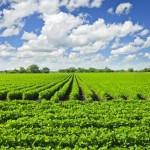 Whenever I drive outside of the city where I live, I find it interesting to watch the nature of the landscape change.
Whenever I drive outside of the city where I live, I find it interesting to watch the nature of the landscape change.
At first the city gives way to more remote neighborhoods and smaller towns. After a while, the landscape becomes large tracts of farmland.
In this part of the upper midwest, those farms are green and rolling.
With the right amount of sunshine and rain, they produce healthy crops. When it rains, the crops turn a little greener and grow a little taller. Some years it rains too much and the fields become saturated. In low spots, the moisture settles in puddles, creating muddy areas. The crops in those muddy places become stunted and eventually the roots rot and die.
That beautiful and productive field isn’t so healthy anymore, because it has become damp.
Dampness in Chinese Medicine
In many ways your body is like a farmer’s field.
You depend on outside sources for nourishment. While the field needs sunshine and rain in just the right amounts to be healthy, you need food, water, and air in the right amounts.
The field is greatly affected by the weather, and so are you.
You are affected by changes in the seasons — you try to stay warm in the winter and active and outdoors in the summer. Many of us get into a funk on an overcast day and others get aches and pains when the barometer drops.
In addition, like the farmer’s field, your body can become damp.
Physical dampness comes from your body’s inability to metabolize fluids well and can create a whole host of symptoms. Dampness can be the culprit behind achy joints, edema, yeast infections, shingles, bladder infections, gout, athlete’s foot, loose stools and diarrhea. Furthermore, when dampness sits around for a long time, it tends to congeal and become phlegm.
A bigger deal about dampness is that excess fat is considered damp tissue — it’s moist and heavy.
According to Chinese medicine, every obese person has some degree of dampness. Generally, the more overweight a person is, the greater the degree of dampness. If that’s not bad enough, most people who are seriously overweight are usually also dealing with phlegm issues in the form of chronic sinus problems, asthma, or postnasal drainage.
Dampness can come from the environment, like living in England or a basement apartment. However, dampness usually arises from poor digestion.
In Chinese medicine, your Stomach and Spleen are the organs most responsible for your digestion.
Your Stomach takes in food and begins the digestive process. Then the food is sent to your Spleen to sift and sort; taking the good stuff and turning it into the nutrients that your body needs, as well as eliminating the stuff your body can’t use.
When your digestion is weak, one of the most common issues is that your Spleen has gotten bogged down and become damp.
If that’s the case, you may have symptoms like a poor appetite, nausea, loose stools, lots of stomach rumbling, and an overall feeling of heaviness. Essentially your Spleen’s ability to absorb, sift, and sort fluids has broken down.
It’s a little like having puddles in your body.
One way your Spleen can get bogged down is from stress or strong emotions upsetting your digestion.
However, it can also happen if you’ve been overeating or overwhelming your digestion with the wrong foods. Lots of sugary foods, rich or greasy meals, saturated fats, and too many rich dairy products can tax your digestion.
Treating Dampness
There’s bad news and good news when it comes to treating dampness in Chinese medicine.
The bad news is that dampness likes to hang around.
It takes some serious work to dry, drain, or resolve the damp.
However, the good news is that it can be done — there are things that your acupuncturist can do and there are also things that you can do.
Your acupuncturist can target your treatments specifically at resolving the dampness. She can also prescribe an herbal formula that can strengthen your Spleen and dry the damp, as well as recommend foods that are most beneficial for you.
Some things that you can do include:
- Avoid large meals, rich foods, sugar and sweeteners, saturated fats and greasy foods.
- Lighten up by choosing foods that are easy to digest, such as soups, stews, and stir fried dishes.
- Eat mostly cooked vegetables, whole grains, and light proteins.
- Drink small amounts of warm or room temperature liquids with your meals. Ice cold drinks just make your Spleen more waterlogged.
- Sit down, sit up straight, and chew your food. Your Spleen will thank you.
- Move your body!
Exercise gets the fluids moving, helps with elimination, warms your body to help dry the dampness, and improves your digestion.